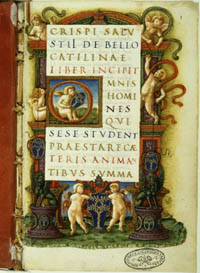
(Image from The Library of Congress Vatican Exhibit: "Rome Reborn"
http://www.ibiblio.org/expo/vatican.exhibit/exhibit/Main_Hall.html
http://www.ibiblio.org/expo/vatican.exhibit/exhibit/c-humanism/images/human11.jpg)
|

|
|
Latin 54
|
|
|
|
Roman History and Biography
|
|
Fall 2003
|
|
|
INSTRUCTOR:
|
Robert W. Cape, Jr., Associate Professor of Classics
|
|
OFFICE:
|
AD 310
|
PHONE: x2241
|
MAIL: 61653
|
EMAIL: rcape@austincollege.edu
|
|
OFFICE HOURS:
|
11:00-12:00 MF, 1:30-2:30 T, & by appointment or just dropping by.
|
- REQUIRED TEXTS:
- Ramsey, John K. (Ed.) Sallust's Bellum Catilinae. Chico, CA: Scholars Press, 1984.
- Kraus, C. S. and A.J. Woodman. Latin Historians. Greece & Rome New Surveys in the Classics No. 27. Oxford: Oxford University Press, 1997.
- Cicero, Selected Political Speeches. Trans. Michael Grant. New York and Harmondsworth: Penguin, 1969 (1989).
- BOOKS ON RESERVE:
- Dominik, William J. (Ed.). Roman Eloquence: Rhetoric in Society and Literature. London and New York: Routledge, 1997.
- Earl, Donald C. The Moral and Political Tradition of Rome. London: Thames & Hudson, 1967.
- Earl, Donald C. "Prologue-form in Ancient Historiography," in Aufsteig und Niedergang der römischen Welt, I.2. Berlin and New York: Walter de Gruyter, 1972. Pp. 842-856.
- Edwards, Catharine. The Politics of Immorality in Ancient Rome. Cambridge and New York: Cambridge University Press, 1993.
- Habinek, Thomas N. The Politics of Latin Literature: Writing, Identity, and Empire in Ancient Rome. Princeton: Princeton University Press, 1998.
- Momigliano, Arnaldo. The Classical Foundations of Modern Historiography. Berkeley and Los Angeles: University of California Press, 1990
- Syme, Ronald. Sallust. Berkeley and Los Angeles: University of California Press, 1964.
- Vasaly, Ann. Representations: Images of the World in Ciceronian Oratory. Berkeley and Los Angeles: University of California Press, 1993.
OBJECTIVES:
This course will focus on the work of Sallust, one of Rome's greatest historians. Sallust wrote historical monographs on important events at the end of the Roman Republic. His books, The War with Jugurtha and The War with Catiline, were and are recognized as important works in the development of the historical monograph and the development of Roman historiography in general. We will read the Bellum Catilinae and use it as a base from which we will venture to explore writings by other Roman historians and biographers. We will also look at contemporary accounts of the war by Cicero, who was directly involved. Some of the issues we will examine are Sallust's use of sources, characterization, moralizing, and writing style.
On Mondays and Wednesdays we will spend most of our time paying close attention to the text of Bellum Catilinae. Most Fridays will be devoted to reports and discussion of scholarship on Bellum Catilinae and on Sallust's historical writing in general. Additional topics will include Cicero's speeches and his views on historiography, the roles of women in Roman public life, politics and morality in the late Republic, Roman political violence in the late Republic, and the nature of Roman historiography and biography.
Attendance and Participation:
This is a seminar style class and regular attendance is required of all students. We must be able to work with and rely upon one another. Students are expected to be prepared for and to participate actively in every class. Lack of preparation is no excuse for not attending. Attendance is not usually a problem in seminars, but the rule will be that only three absences are allowed. Each absence after the third will lower the total grade by three percentage points. With seven absences (over two weeks) a student may be dropped from the course.
Assignments and Grading:
Homework assignments are given daily for the next day's class. These are to be completed prior to the class meeting and will be the basis for that day's participation. In addition, there will be an occasional written homework assignment to be turned in at the beginning of class. Students are responsible for finding out what the homework assignment is if they have missed a class. Homework, quizzes and exams missed during an absence cannot be made up except under exceptional circumstances.
A short, 10-15 minute quiz will be given every week. These quizzes are meant to help students review material recently covered and serve as diagnostic instruments to indicate how well they are progressing in discrete areas of grammar, vocabulary, and comprehension. The midterm and final are comprehensive exams which measure the student's total progress at specific points in the course. The midterm will be given during the sixth or seventh week of class; the exact date will be announced at least two weeks in advance. The final will be given at the regularly scheduled time, 3:00 - 5:00 p.m. Wednesday, December 10. The midterm and final may include "take-home" sections.
Each student will give two reports during the semester, one on a portion of the text we are reading and one over selected scholarly work on Sallust or a topic. There will be one 10 page term paper, due at the time of the final exam, on a topic of the student's interest, and taking into account the relevant secondary literature.
Grade percentages:
| weekly quizzes |
10% |
| written homework |
10% |
| attendance and participation |
15% |
| midterm |
20% |
| final |
20% |
| presentations |
5% ea. |
| term paper |
15% |
Austin College's Standards of Academic Integrity are assumed to apply to your work for this course. The Academic Integrity Policy can be found in the "Student Conduct" section of The Austin College Environment. All work must be your own. Infringments of the Academic Integrity Policy may result in failing grades on assignments, for the course, or withdrawal from the course.
[Bob Cape's Homepage]
[Classical and Modern Languages]
Robert W. Cape, Jr., Associate Professor of Classics
Classical & Modern Languages
900 N. Grand Avenue, Suite 61653
Sherman, TX 75090-4440
phone: (903) 813-2241 fax: (903) 813-2011
| 
|
Mail comments to rcape@austincollege.edu


